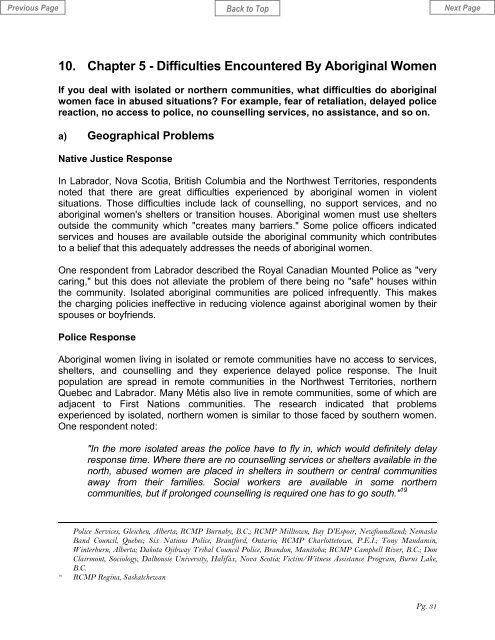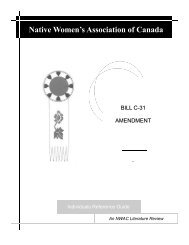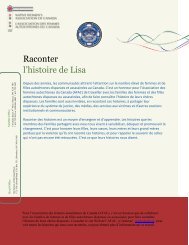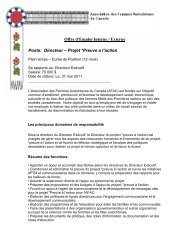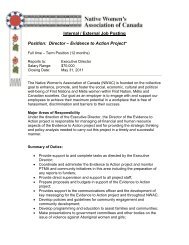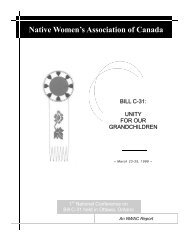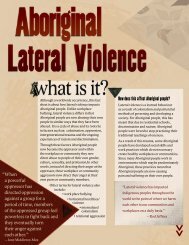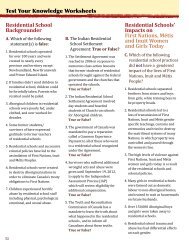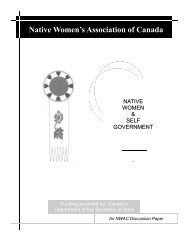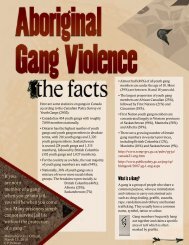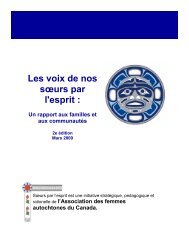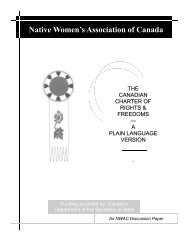Men with violent tendencies must decide to end the abuse of women and children. "Menhave to control themselves." The <strong>Native</strong> justice respondents found that while theseinitiatives are helpful to victims of crime, what is more urgently required are initiatives formen which are preventative rather than punitive. In the Northwest Territories, onerespondent felt that abusive behaviour that is learned can be unlearned. The crux of theabusive situation is that aboriginal women will not use alternatives to domestic violenceif they have little knowledge about the criminality of spousal abuse.Counselling services need to be made available within aboriginal communities. "Thisincludes counselling for everyone: victims, offenders, children, adults, families…Counselling as an alternative to court." Abused aboriginal women victims need to bemade aware of their legal rights in domestic violence situations. "Victims have to bemade aware that abuse is not acceptable, [and] that they don't deserve what happens tothem." The cycle of abuse can be prevented with the development and implementationof a community education process on domestic violence. Some other service needsbrought forward in the survey called for victim advocacy centres, rape crisis centres,crisis lines, the re-examination of priorities and s funding practices of agencies, andmediation or reconciliation services as an alternative to present practices.Indian Act governments and the entire aboriginal community can begin takingresponsibility for eradicating domestic violence. But this will only occur when theaboriginal community adopts a zero-tolerance policy and enforces it against violentmen. One respondent noted that increasingly there are shelters being built in aboriginalcommunities. Indian Act governments are receiving a lot of "flak" for being unresponsiveto women victims. Some Indian bands are giving support to setting up shelters in nearbynon-aboriginal communities. Indian Bands also provide family care workers and someIndian Bands have healing circles. Aboriginal women should be encouraged to organizethemselves against violence. This was accomplished by one women's group inSaskatchewan called the Women's Aboriginal Coalition Against Domestic Violence.d) Aboriginal Women's Role<strong>Native</strong> ResponseAbused aboriginal women in violent situations can also make a choice to change theirlifestyle. Aboriginal women can decide to help themselves by leaving violent situations.A friend or relative can assist women who are afraid to leave. Where alcohol and drugabuse by women contribute to family violence, her spouse can give her support to seekrehabilitation. If possible, she may have to leave for a few months to take in-housetreatment, or take a 28-day program for drug and alcohol abuse. 1818Contributors to the chapter include: Conne River, Nfld.; MicMac <strong>Native</strong> Friendship Centre, Halifax, N.S.; <strong>Native</strong>Women's Transition Centre Inc., Winnipeg, Manitoba; RCMP Ottawa; Gitksan-Wet'suwet'en Education Society,Hazelton, B.C.; Arctic PLEI; Aispich Chakwan; Justice Manitoba; Justice New Brunswick; Judge Coutu, Quebec;Akwesasne Mohawk Police; Kuujjuaq; Ministry of Community and Social Services, Windsor, Ontario; RCMPWinnipeg; Chief Coroner, GNWT; Labrador Legal Services, Happy Valley-Goose Bay, Labrador; Hey-way'-noqu'Healing Circle for Addictions Society, Vancouver, B.C.; Ontario Ministry of the Solicitor-General; RCMP HappyValley, Labrador; Saskatchewan Justice; Yukon Public Legal Education Association, Whitehorse, Y.T.; Siksika NationPg. 30
10. Chapter 5 - Difficulties Encountered By Aboriginal WomenIf you deal with isolated or northern communities, what difficulties do aboriginalwomen face in abused situations? For example, fear of retaliation, delayed policereaction, no access to police, no counselling services, no assistance, and so on.a) Geographical Problems<strong>Native</strong> Justice ResponseIn Labrador, Nova Scotia, British Columbia and the Northwest Territories, respondentsnoted that there are great difficulties experienced by aboriginal women in violentsituations. Those difficulties include lack of counselling, no support services, and noaboriginal women's shelters or transition houses. Aboriginal women must use sheltersoutside the community which "creates many barriers." Some police officers indicatedservices and houses are available outside the aboriginal community which contributesto a belief that this adequately addresses the needs of aboriginal women.One respondent from Labrador described the Royal Canadian Mounted Police as "verycaring," but this does not alleviate the problem of there being no "safe" houses withinthe community. Isolated aboriginal communities are policed infrequently. This makesthe charging policies ineffective in reducing violence against aboriginal women by theirspouses or boyfriends.Police ResponseAboriginal women living in isolated or remote communities have no access to services,shelters, and counselling and they experience delayed police response. The Inuitpopulation are spread in remote communities in the Northwest Territories, northernQuebec and Labrador. Many Métis also live in remote communities, some of which areadjacent to First Nations communities. The research indicated that problemsexperienced by isolated, northern women is similar to those faced by southern women.One respondent noted:"In the more isolated areas the police have to fly in, which would definitely delayresponse time. Where there are no counselling services or shelters available in thenorth, abused women are placed in shelters in southern or central communitiesaway from their families. Social workers are available in some northerncommunities, but if prolonged counselling is required one has to go south." 19Police Services, Gleichen, Alberta; RCMP Burnaby, B.C.; RCMP Milltown, Bay D'Espoir, Newfoundland; NemaskaBand Council, Quebec; Six Nations Police, Brantford, Ontario; RCMP Charlottetown, P.E.I.; Tony Mandamin,Winterburn, Alberta; Dakota Ojibway Tribal Council Police, Brandon, Manitoba; RCMP Campbell River, B.C.; DonClairmont, Sociology, Dalhousie University, Halifax, Nova Scotia; Victim/Witness Assistance Program, Burns Lake,B.C.19RCMP Regina, SaskatchewanPg. 31


